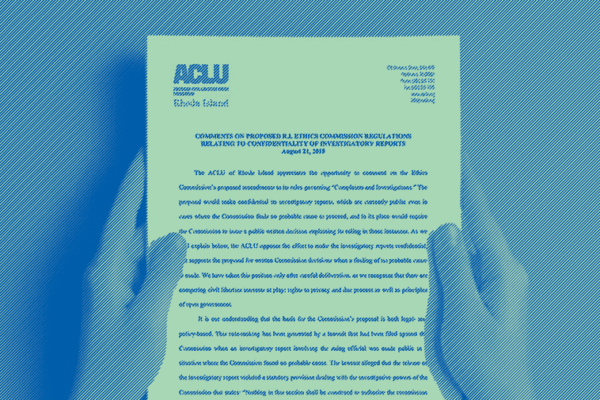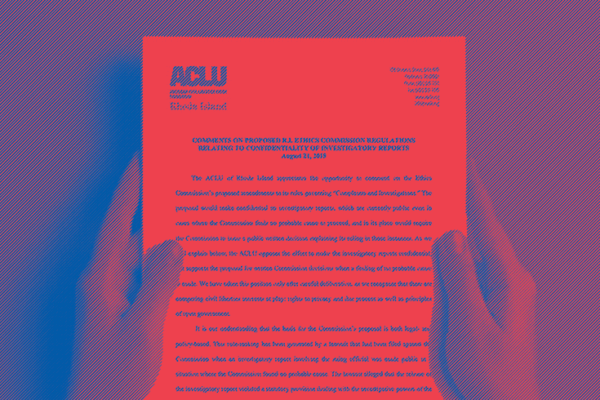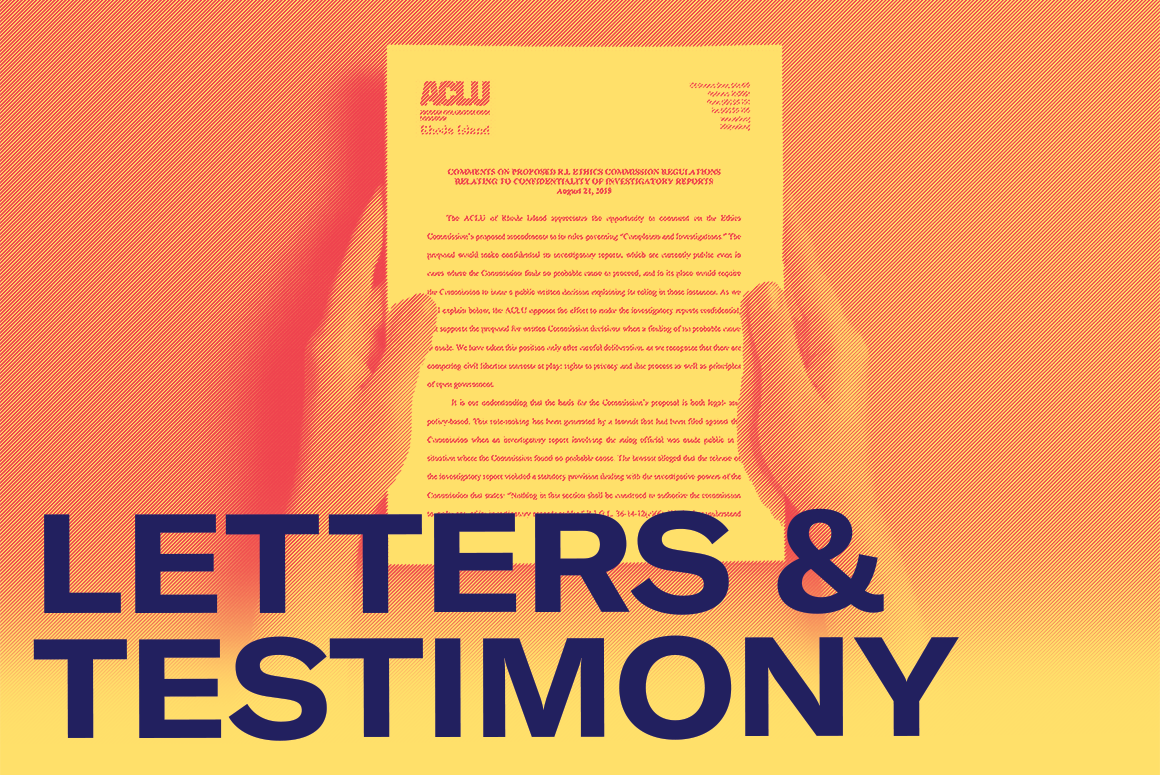Help us protect civil liberties here in RI
Make an end-of-year tax-deductible donation to support our work in the courts and the community!


CAMPAIGN: COVID-19 & Civil Liberties in RI
Last updated on April 01, 2020
CAMPAIGN: COVID-19 & Civil Liberties in RI
The ACLU of RI continues to monitor the government's response to COVID-19 and its impact on civil liberties. Our related actions are motivated by the following principles:
- Government responses should be based on science & public health.
- Any response plan must protect the health, safety, and civil liberties of all.
- We need to pay particular attention to the most vulnerable people in our society, including people who are detained and incarcerated.
- Government transparency and the right to vote are fundamental to our democracy – especially in times of crisis.
INCARCERATED & DETAINED PEOPLE
More than half of the total ICE detainees at Wyatt have been conditionally released due to a class action lawsuit we filed. Here are some highlights from our other work on this issue:
- In March 2020, we wrote to officials at both the Department of Corrections (DOC) and the Wyatt Detention Center, calling on them to immediately develop evidence-based and proactive plans for the prevention and management of COVID-I9. That letter is here.
- In April 2020, we filed an Access to Public Records request with state officials for information about RI’s plans to address a likely, and potentially catastrophic, outbreak of COVID-19 at the ACI. Click here for more info on that.
- In early May 2020, we wrote to the RI DOC requesting that officials start making public bi-weekly reports documenting COVID-19 cases, testing and other data. Wyatt has already been court ordered to do this, the DOC must follow suit. Click here for the letter we sent.
VOTING RIGHTS
Our class action lawsuit led to the suspension of mail ballot witness/notary requirements for the September and November 2020 elections.
DUE PROCESS & ECONOMIC JUSTICE
We filed a successful class-action lawsuit challenging the state Department of Labor and Training’s (DLT) actions in summarily freezing unemployment benefits for hundreds of Rhode Islanders without notice.
STUDENTS' RIGHTS
Following our objections, South Kingstown favorably amended a recent executive order barring gatherings of more than 15 people for any reason. In response to concerns raised by the ACLU and others, Education Commissioner Infante-Green issued guidance to districts ensuring that students with disabilities obtain necessary in-person instruction. We also conducted a thourough review of school district tech privacy policies and urged them to strengthen privacy rights for students.
OPEN GOVERNMENT
In March 2020, Governor Raimondo issued an executive order suspending certain provisions of both the Open Meetings Act and the Access to Public Records Act. While the ACLU recognizes that some relaxation of these laws is appropriate in light of social distancing requirements, the scope and breadth of the order were deeply concerning. In response to an ACLU and Common Cause of RI letter calling on the Governor to revise the order, her office has since issued additional guidance to state agencies and municipalities that incorporates almost all of the recommendations proposed. As a follow up, the ACLU sent a letter to municipal leaders in RI urging them to ensure public bodies under their jurisditions abide by the new standards for transparency. When the EO suspending provisions of the APRA failed to expire after more than two months, seven open government organizations sent the Governor a letter calling on her to repeal the order in the interest of the public's right to know.
QUARANTINE
The ACLU continues to monitor the state's actions in quarantining individuals and technological approach to contact tracing. We have written the state about the lack of due process procedures to challenge a quarantine order as well as the state's failure to have the infrastructure in place to ensure that people quarantined have access to food and other necessities.
RIGHTS OF PEOPLE WITH DISABILITIES
In April 2020, a large group of RI organizations, including the ACLU of RI, sent a letter to Governor Raimondo demanding that she issue a clear directive to prohibit discrimatory treatment of people with disabilities in accessing emergency and/or life saving medical treatment during the pandemic.
4TH AMENDMENT RIGHTS
An Executive Order from Governor Raimondo issued in March gives police the power to stop cars with ANY out-of-state license plates coming into Rhode Island. Police exercise of this power raises extraordinarily serious constitutional concerns, and the ACLU has called on the Governor to amend or repeal the EO in question. However, because - during the stops - the police do not ask for ID, disavow any attempt at law enforcement, and take no action against drivers who refuse to provide info, the ACLU has not taken legal action. We continue to closely monitor the situation. Our blog post providing more detail on our position, which was also published as an op-ed in the Providence Journal, can be found here.
PRIVACY
We issued a statement regarding the Governor's announcement of a voluntary contact tracing app. In response to news reports that the Department of Health is sharing with law enforcement the addresses of people who have COVID-19, we sent a letter expressing grave concern and urging the DOH to cease this information-sharing. That letter is here.



